#probably because so much of post-crisis is written by starlin too but still
Text
A lot of people probably are gonna hate me for this, and if you disagree with what I’m about to say, please don't bother to respond, just ignore me completely and move on, go make yourself happy.
It’s just that I honestly don't see how this:
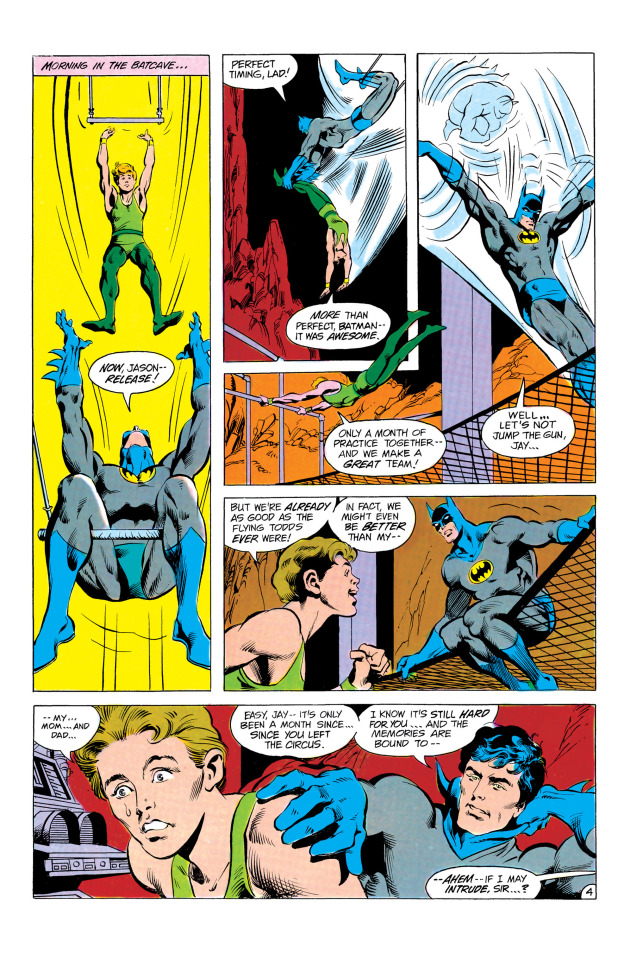
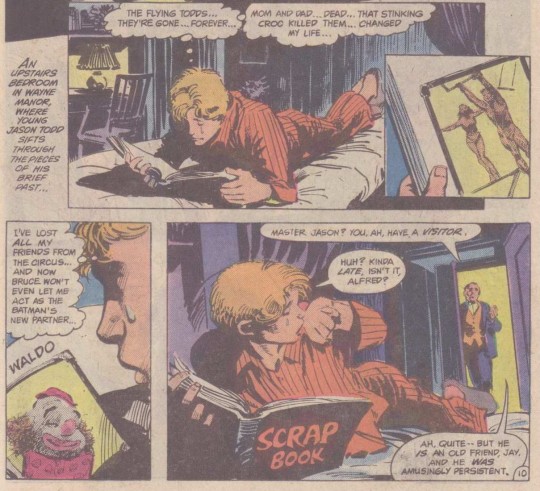
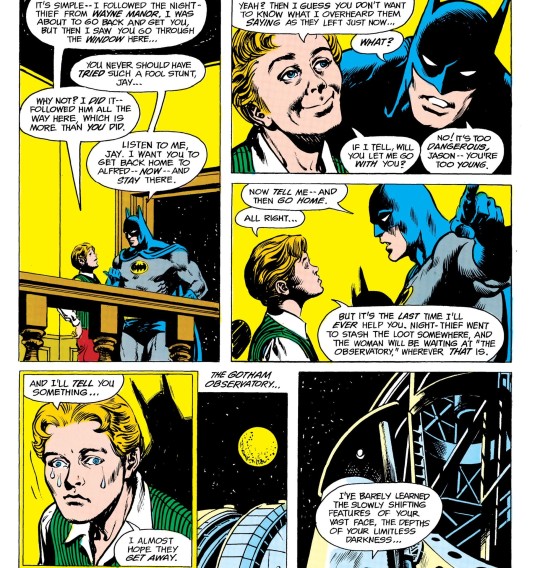
can be the same as this:
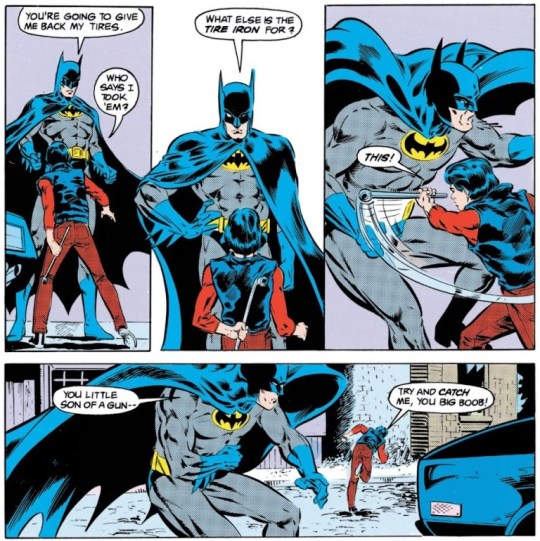
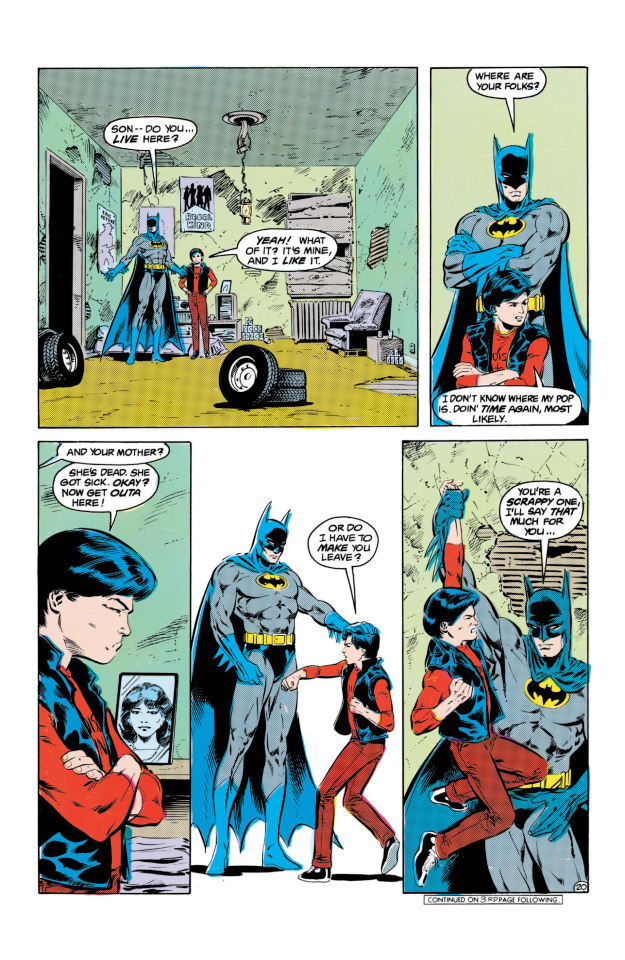
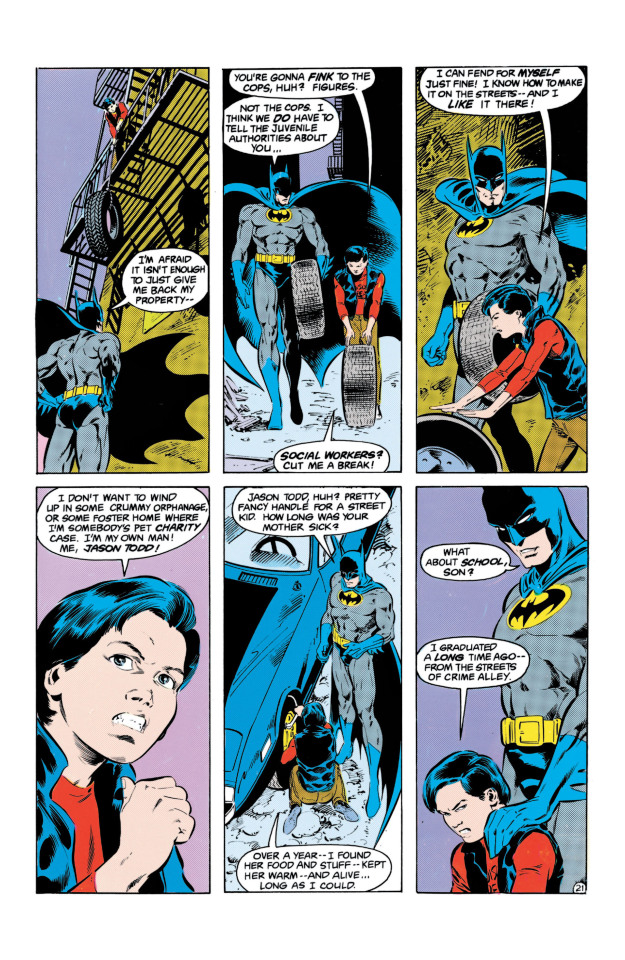
Personally, I don't care for Dick-lite Pre-Crisis Jason at all, because he’s never seemed to me a real character with any real personality of his own, and I just really don’t buy the idea of a teenager, with still very recently murdered parents that might as well be every bit as the same kind of loving parents and positive influences to their kid as the Flying Graysons, getting over the loss of their old parents’ and accepting someone they’ve only just met around the time their parents died as his true new parent in practically no time at all...especially when it’s happened in a world where a preteen could end up spending the rest of his adulthood fighting crimes in a bat suit after witnessing his parents being gunned down by a mugger.
The only thing Pre-Crisis/Earth 1 Jason Robin seemed to have going on was being a son to Batman/Bruce (and a son to Nocturna, because clearly if he could’ve gotten over his real dad so easily, why wouldn’t he have also gotten over his real mom and come to think of this mysterious criminal lady as his true new mom when she had wanted so much for him to be her son and they had lived together for like a week)--and I feel that if the executives at the time had really wanted Bruce to become a dad, they'd probably just let him settle down and give him a biological child as in the Golden Age, but instead they gave him a second Robin; and the way they laid themselves out to make the relationship between him and this second Robin to be exactly father-and-son despite the fact that Bruce would’ve had to be real stupid to actively endangering a young person whom he consider his own little boy by bringing him to fight crimes just never sits right with me.
It always seems to me like they’re just trying to retcon the original Batman and Robin relationship without actually retconning Bruce and Dick, who hadn’t really been Bruce’s adopted kid just then and had often regarded his mentor Bruce as more of his older brother/closest friend rather than just plain old “dad”--It’s like they’re just trying to remove every implication that there's ever anything gay/creepy in the original Batman and Robin dynamic, simply by bringing in another Robin character, one with the exact same backstory as Dick and nothing that could actually differentiate him from Dick (except him being originally blond-haired and himself outright telling people that he’s “not Dick” in one of his few featurings in the New Titans where he’s portrayed as every bit as much as a smart, decent, capable young person equipped to be a successful young hero just as Dick Robin or Tim Robin would’ve easily been portrayed), and making his relationship with Batman to be plainly, unequivocally father-and-son, then with there being no actual difference between Robin II and Robin I and the two Robins being virtually the same, sure the viewers would see that the relationship between Batman and Robin II and the relationship between Batman and Robin I are very much the same too, and no one could say if there’s any resemblance of a gay couple with a creepy age difference in the original Batman and Robin’s dynamic ever again since they’ve always been father and son.
It just feels so manipulative to me and I hate it, but that’s just how I feel and I’m not saying that it’s truly the case. I’m sorry if this offends anyone who loves Earth 1 Jason. If you love him, that’s great. There’s nothing wrong to love a wholesome Robin and his altogether wholesome relationship with Batman, nor there’s anything wrong to love Red Hood Jason but prefer his softer New52 version which would’ve certainly seemed to be a less drastic change from his Pre52 version if he’s more like his Earth 1 counterpart to begin with.
There’s absolutely nothing wrong to prefer one version of a character to another, to just say fuck canon and recreate a character you love into the way you could enjoy them most and have all the fun you want with them.
What gets to me and drives me bonkers, is when people couldn’t just be happy with their headcanon, but have to go out of their way to tell other people that it’s fact that Pre-Crsis/Earth 1 Jason and Post-Crisis/New Earth Jason are the same character, while in actuality, they weren’t even meant to be the same in the first place.
If DC had ever wanted to just keep using Pre-Crisis Jason but give him a new backstory, they would just follow up on whatever he had been doing with Bruce as his pre-crisis self while casually throwing in his new backstory at some point, just as they did with a lot of other characters such as Donna post-crisis, not give him a full reintroduction in Batman #408 and rewrite his relationship with Bruce from the ground up.
It just makes me want to scream, when people, who never seems to have a lot of problems with Under the Hood and maybe also Lost Days, have to go out and call every portrayal of Pre-52 Jason and some of the more recent Red Hood Jason that shares a resemblance to him wrong for not portraying Jason as that sweet little bookworm he really truly was, and that an entire different life experience just cannot change a character in any substantial way, and Jason being an angry kid with aggressive and violent tendencies is just something that had never been established until the more recent retcon/the OOC work of Jim Starlin, while in truth Pre-Crisis Jason with the exact same backstory as Dick just simply cannot be the same as Crime Alley Kid Jason, who doesn’t even have the same biological parents as Pre-Crisis Jason to provide him with the same gene that the Flying Todds, which were Joe and Trina Todd, had created their son with.
If Pre-Crisis Jason and Post-Crisis Jason are one and the same, then it’d mean Dick is also very much the same as Jason is the same as Tim is the same as Damian is the same as Bruce and no one character is truly unique and special because every character ever made is just an alternate version of another character.
It had been shown most clearly since his first appearance that Post-Crisis/New Earth Jason, other than literally being a different kid with the same name, was nothing like his pre-crisis counterpart, but rather a bold, outspoken, confrontational, fully independent and proactive ghetto kid, who had got some serious stones to rob Batman’s gear, actually succeed in taking the tire off the freaking Batmobile and getting away originally, and had only run into Batman when he had come back to steal more, and called Batman a “big boob” after he had given him a good hit right in his Bat stomach.
This precious cupcake here↓

↑...that was often used as a proof that the NE Angry Robin Jason is a later retcon/ mere misconception had actually only ever existed in Detective Comics #569-573 during the earlier part of the writer Mike Barr’s run. These 5 issues from Barr are all notably 60s-ish, and while they’re published after CoIE and Batman Year one, it’s clear that they’re Earth 1 stories, seeing that they’re written with characters such as Earth 1 Catwoman. It was only in #574 that Jason’s New Earth origin was first introduced in Detective Comics, right before Batman Year Two; and although the issue was still written by Mike Barr and it did seem to have followed directly after #573, the previous issue was ended with the caption of “The New Origin of Batman”, and the tone of #574 as well as the writer’s latter issues and his portrayal of Jason Robin were no longer the same.
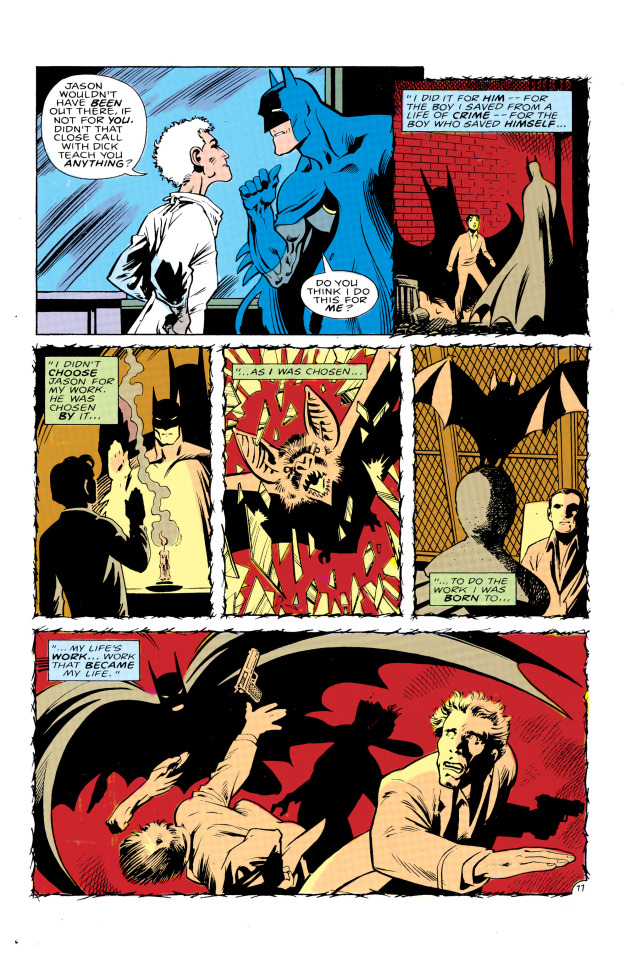
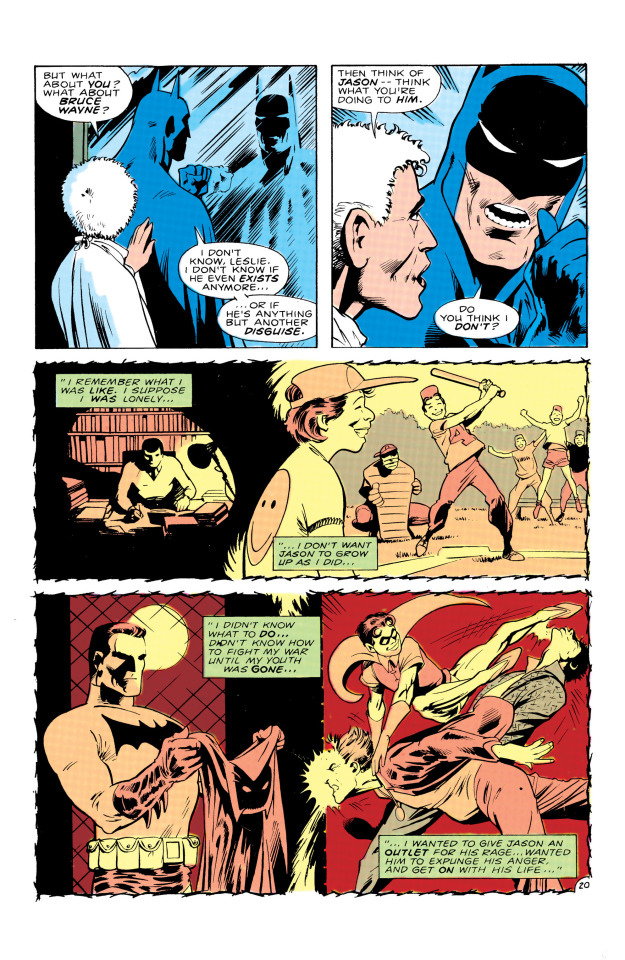
↑Detective Comics #574↑
It was stated by Bruce repeatedly, in both his own title and Detective Comics, that the reason he had taken in NE Jason as his new Robin was to save him from walking down the wrong path and to provide an outlet for his rage.
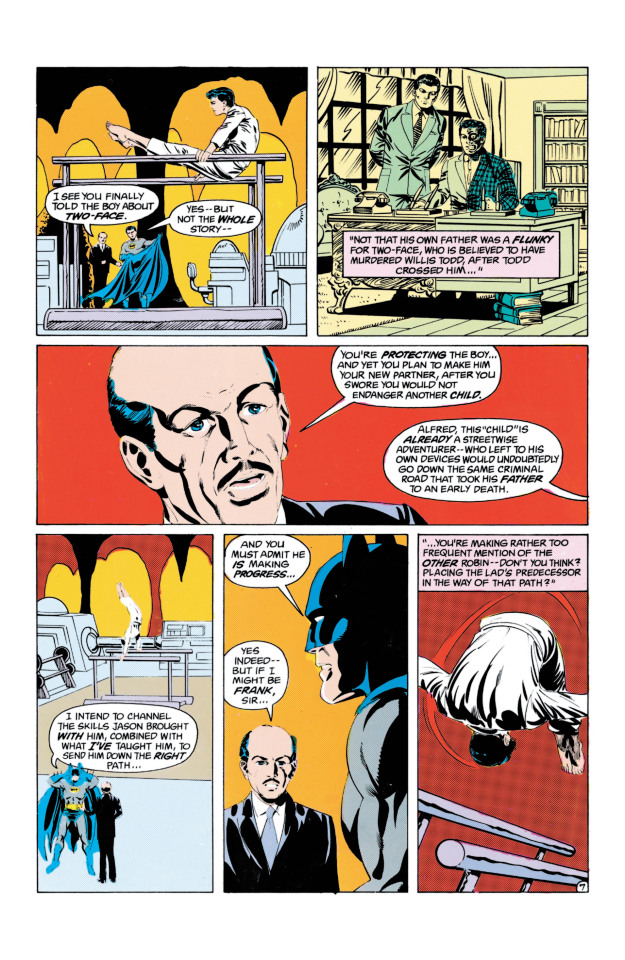
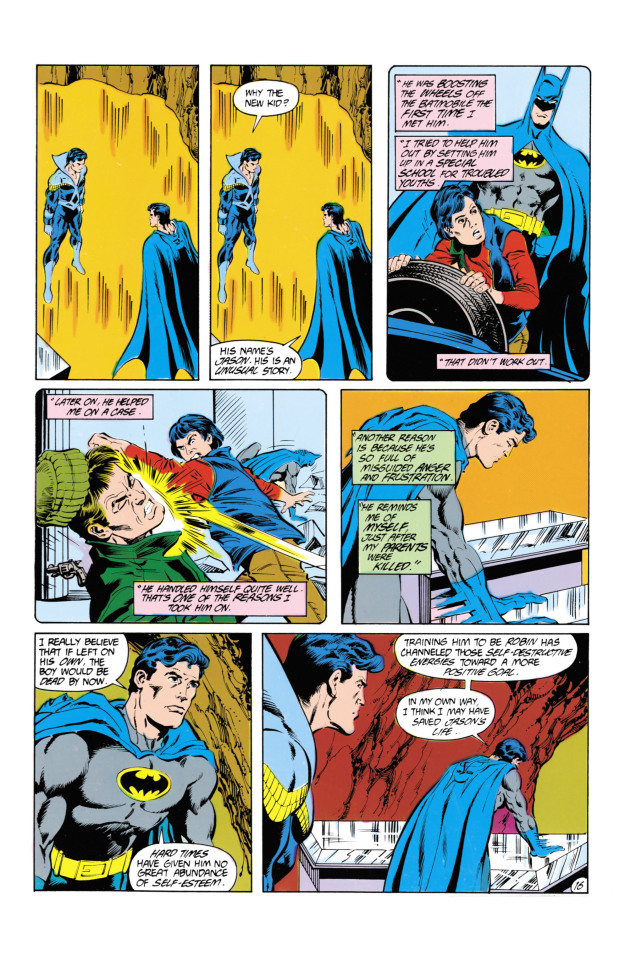
While no doubt Jim Starlin’s NE Jason Robin (that everyone hates) was the most aggressive and violent, it had never contradicted how the character was initially written by Max Allen Collins, the writer of Batman #408.
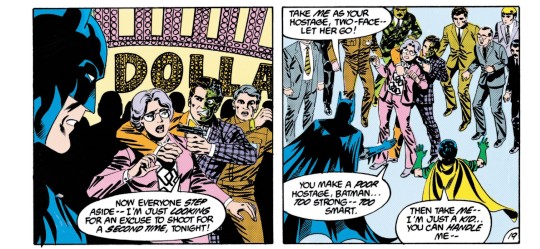
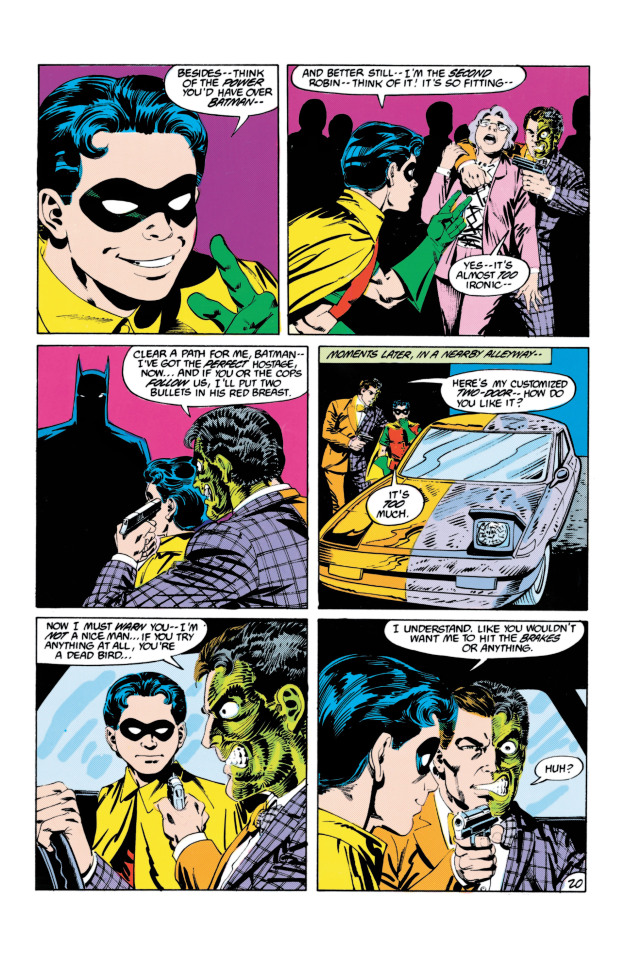
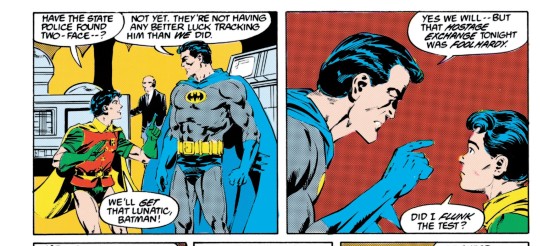
↑Batman #410 by Collins↑
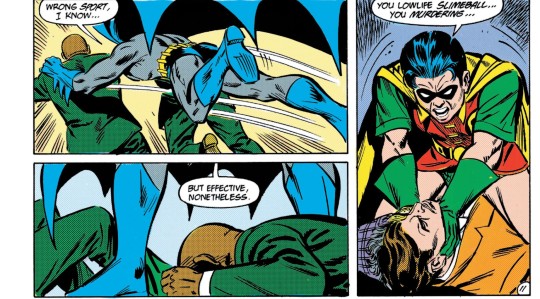
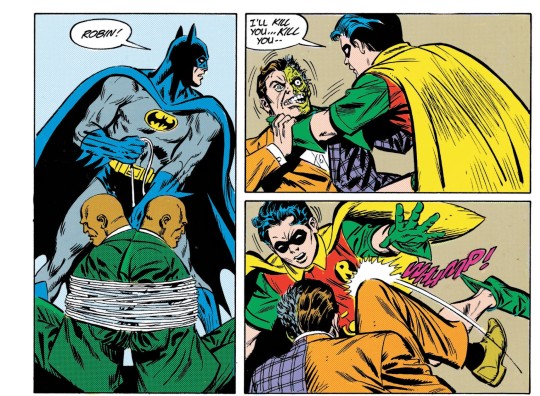
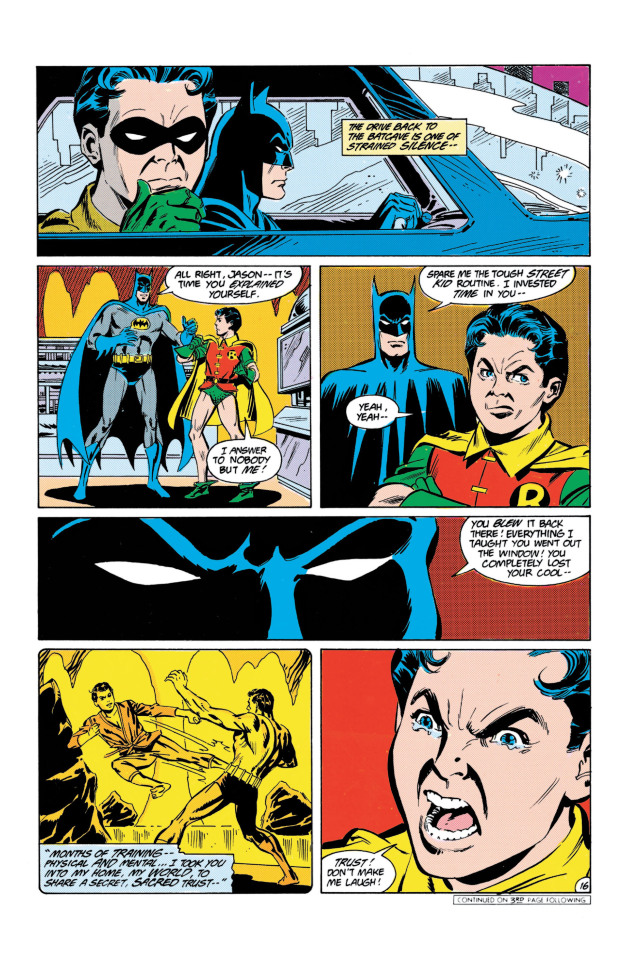
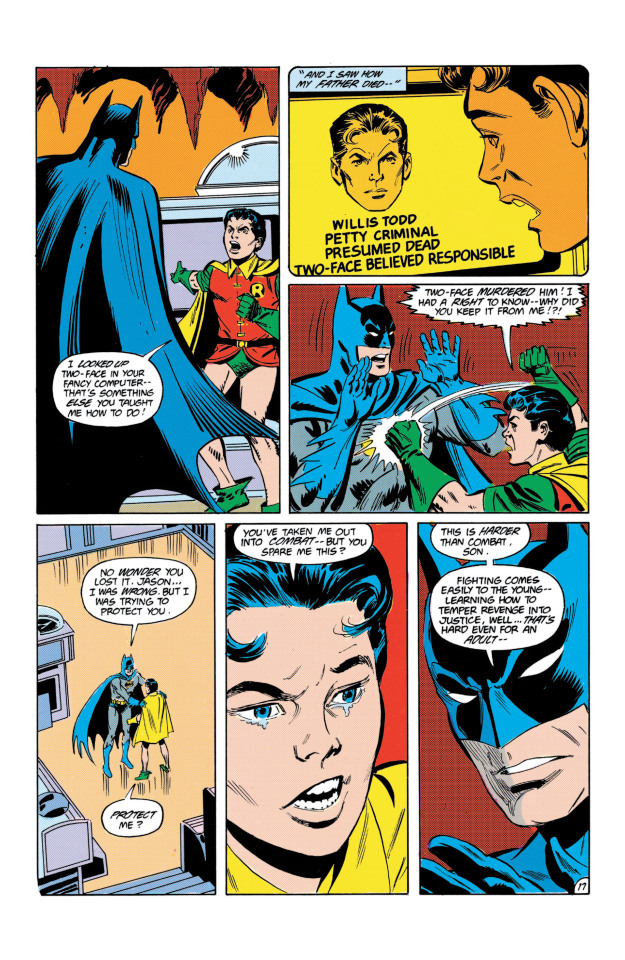
↑ Batman #411 by Collins, after Jason had found out that Willis was murdered by Two-Face and Bruce had been hiding the information from him ↑
Although in the end of Batman #411, Jason did seem to have gotten over his anger and saved Two-Face’s life, judging by the way he’d talked about his dad Willis in his first introduction and the fact that he’d never before bothered to find out what had happened to the man the whole time while he’s in the manor where he had all the resources to acquire the information, it was doubtful that he and Willis had had a good relationship, and what he’d felt for his crook dad then could hardly be the same as what he felt later in “The Diplomat’s Son” story.
NE Jason had always been consistent in being a fearless, proactive, feisty individual with a hot temper, even in the hand of a writer with a much mellower sense of writing like Mike Barr.
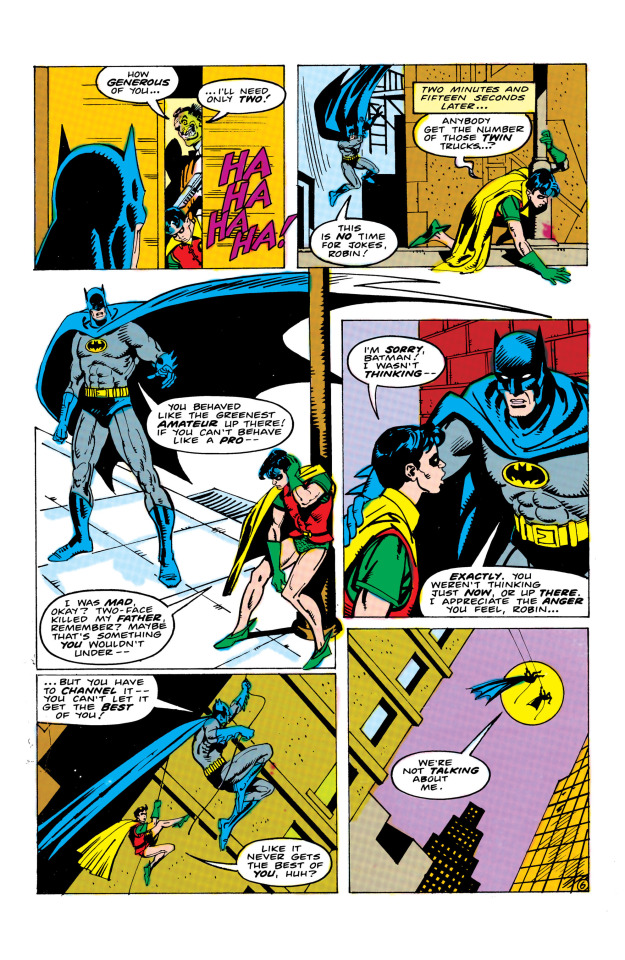
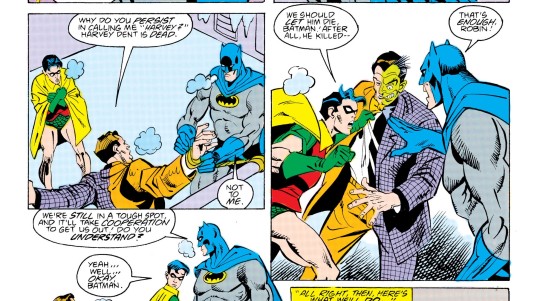
↑ Jason and Bruce encountered Two-Face again in Detective Comics #580-581 by Barrs ↑
It had been established from the get-go that NE Jason Robin was the type of kid who would challenge Batman and go out handling a criminal on his own without consulting him or anyone else first, and was morally questionable with tendencies to aggression and violence, which was perfectly understandable for someone with his background--Only at the beginning it’s easy to brush these things off, because there's never any real consequence to his behavior and so Bruce was okay when he’d behaved this way at the beginning, and since Jason’d still got a lot to learn and was eager to learn from Bruce at the beginning, it would only be right that he’s more agreeable and willing to obey Bruce, but once he had completed his training and been allowed on the field, it would also only be right for him to feel like he had learnt enough and gotten the hang of the business already, and so just easily slipped into his old habit of handling things on his own, just as he had always been while he had been surviving in the Crime Alley on his own before Bruce came along.
NE Jason Robin wasn’t suddenly turned from 0-100 in The Diplomat’s Son story (though I really doubt that it’d be impossible for someone, especially someone around Jason’s age, to go from 0-100 if they have to deal with what Jason had dealt with in the story)--
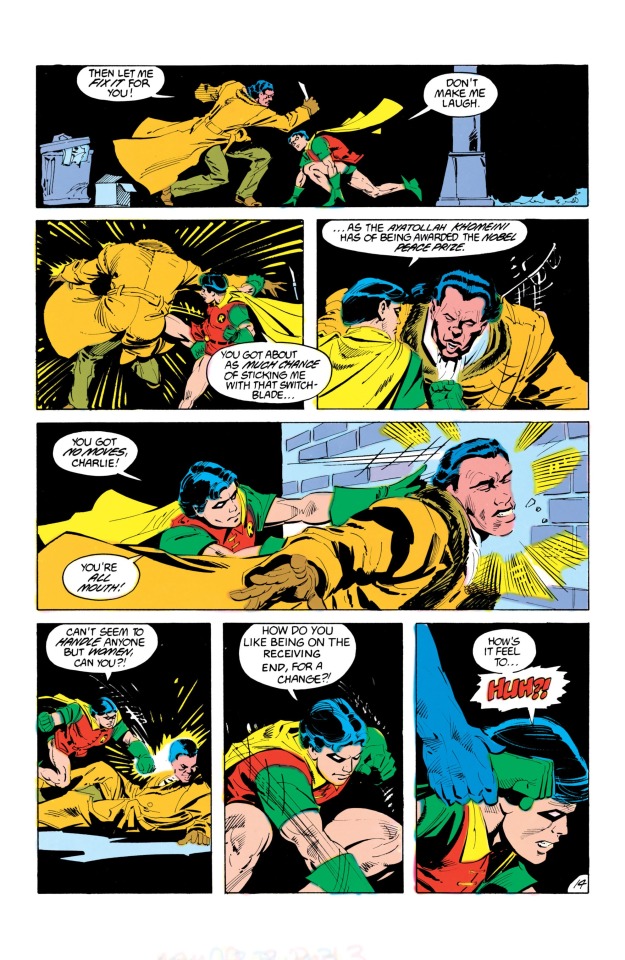
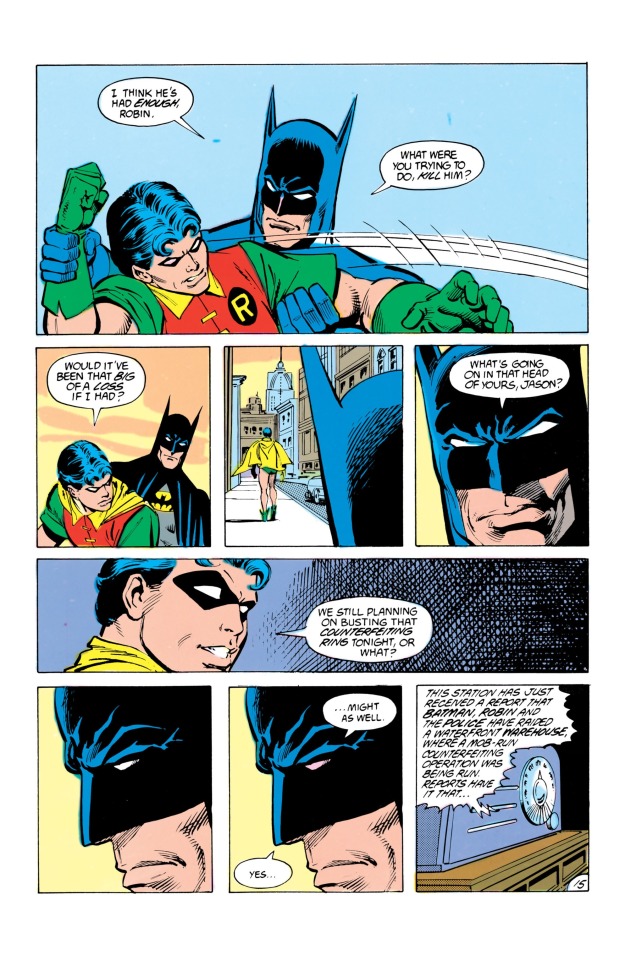
↓ This didn’t happen until after the diplomat’s son was let go by the police due to his status, and on his way out of the police station where he’d been initially brought in by Jason and Bruce for raping and kidnapping an innocent woman, the mofo called his victim right in front of Jason and Bruce and threatened her on the phone, which led the woman to immediately commit suicide.
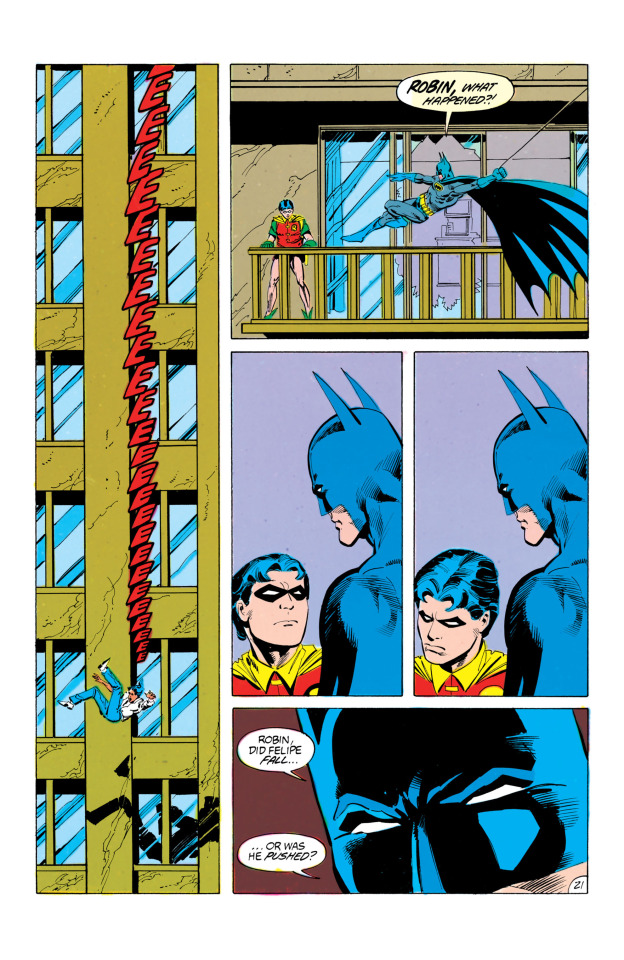
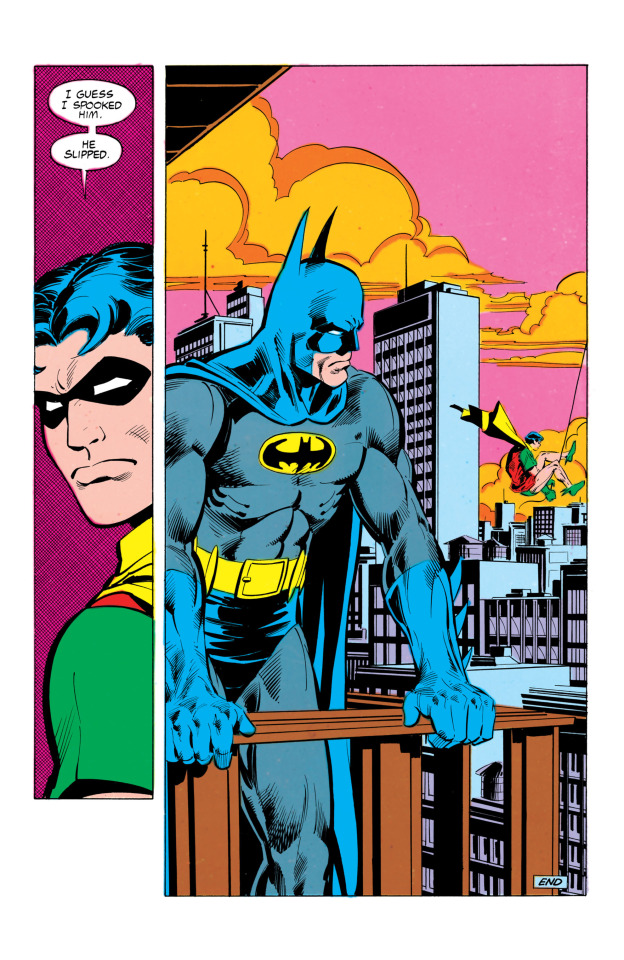
I’ve always thought it’s a good story and a lot more tasteful than it’s usually given credit for. It wouldn’t even have been the first time a “teenage superhero” has killed in the DCU (whether it was accidental or intentional); it’s certainly not something so dark and controversial that DC wouldn’t go for it, they could’ve easily just gone for it and had Jason Robin murder a criminal then, except they never really showed that he did. The audience just naturally assumed that he did because the whole scene was shown through Bruce’s view, and Bruce could see that even if Jason didn’t really kill the rapist then, he might very well be capable of it, and it makes the whole Under the Hood storyline as well as the continuation of Red Hood Jason possible.
The concept of Under the Hood and the continuing existence of Red Hood Jason works, instead of just being a complete character assassination like One-Year-Later Cass, only with Jason being his post-crisis version with all of his very established traits and his very established problems with Bruce.
If Under the Hood Jason is indeed Earth 1 Jason or similar to him, he would really need to be under some outside influence for him to do the things he had done, for there’s just no other justification for his action.
He would really have to be driven mad by the effect of the Lazarus Pit (which has only ever been showed to exist momentarily on other characters), he would have to be incapacitated the whole time, unable to control his own action or even form any conscious decision--and it would only make it extremely possible for him to do something truly awful such as killing some innocent or other heroes or even someone in the Batfam, since he wouldn’t be able to stop himself even if he wanted to, or be able to tell if that’s wrong; that’s what being incapacitated means, that’s why people who’s committed crimes, even as bad as murders, cannot be held legally accountable when they’re proven to be mentally ill--and if that’s truly the case, then Bruce as well as Dick (who had a pretty amicable relationship with Earth 1 Jason) and everybody else who has any knowledge about the matter would all have to be some real awful persons to not lift a finger to help him, by making it a point to stop him from committing any more murder that he wouldn’t have committed if he could help it, and figuring out a way to relieve him from the influence by means of the various science and magic overflowing in their world, like they’ve repeatedly done for many others who’ve been in the similar position, and eventually getting him the hell out of this altogether traumatic crime-fighting life, so he could finally begin to heal from his extensive traumas, including being forced to kill which has always been a very common cause of PTSD for soldiers at war; and even if Jason doesn’t leave the crime-fighting life forever, he could no longer continue operating as the Red Hood; it’d just make no sense for him to keep up the identity previously belonged to his murderer, and have it constantly remind him of how he didn’t just get brutally murdered, he was also forced into becoming a murderer himself, which.he never would’ve become if he wasn’t literally out of his mind.
Moreover, there could never have been a Tim Robin (even if Tim didn’t go by Robin but something else), if the Jason who died in A Death in the Family had the same disposition as Earth 1 Jason and none of his NE traits which was the one and only justification Bruce had for taking in Tim as his third teenage partner, seeing that Tim is patient and careful and cooperative with all the qualities to become the same kind of hero like Dick, and not at all “reckless” and “rebellious” like NE Jason, and so he’s likely to turn out like Dick and not get himself killed like Jason (that’s the only true significant retcon Pre52 Jason had. Although NE Jason Robin could be rather reckless and rebellious, that’s certainly not why he had gotten killed. They just made Bruce and everyone pretend that that’s what killed him, so it wouldn’t seem so utterly horrible for Bruce to endanger another teenage kid with no superpower or any previous fighting training by bringing them in the business that had already gotten one kid killed, and also for Dick and everyone else to just let him).
It’s a complete disregard of facts and logic to call Earth 1 Jason and Red Hood Jason the same character, which doesn’t really matter as long as it’s only headcanon; but when people push it as a fact, it really just sound to me like they’re saying that it’s wrong to like Pre 52 Jason/Post-Crisis Jason Robin, which I very much do because I actually think he’s an interesting character with an interesting and more coherent story than a lot of other DC characters.
It’s like they’re saying that it’s just plain wrong and unnatural for a person to have aggressive and violent tendencies and be inclined to criminal behavior simply because they had grown up in a most crime-infested place and had to rely on themselves and learned to do what it takes to survive since before twelve, or become more and more violent simply because they’ve been made to work in an extremely violent environment and have never been provided with any kind of actual aid for their mental health the entire time.
It’s like that if a person, after being brutally murdered and then coming back to find that their mentor/guardian who was the closest thing they had to a family and was also responsible for their death in a major way just didn’t seem to be giving any shit about that at all, is filled with such murderous rage that they could very well just go out and kill a bunch of criminals, but they aren’t actually a smol whump baby with no absolutely agency of their own that must be protected at all times all along, then they’re just no good at all and don’t deserve any love or respect or understanding.
...I don’t like myself for ranting about this. I hope I could just not give any shit about this dumb thing, but it’d been driving me crazy and I’d just got to let it out.
22 notes
·
View notes
Text
Reappraising Companions
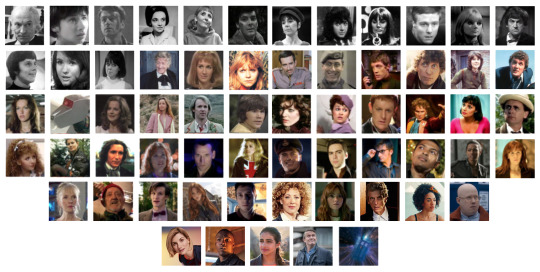
Years after having watched every available episode of Doctor Who, I've had plenty of opportunities to rewatch episodes time and time again. As with most movies and television, I've found revisiting certain stories and eras has caused me to see them in a different light. A story I may have once reviled is suddenly more interesting. I even came to appreciate Peter Davison's performance as the Fifth Doctor for its subtle nature. But what about companions? Are there any companions I didn't care for at first, which I've softened toward over time? That is the question I wish to explore.
Below I've chosen a selection of companions of whom I had initially disliked for various reasons. They span across multiple eras and both the classic and modern versions of the show. With each companion, I have endeavoured to be fair in my reappraisal, but this doesn't mean I've changed my mind. I would also like to state that none of these appraisals are about the actors. My goal is to evaluate companions by the way they were written. The performance will come secondary.
1. Danny Pink

I chose Danny Pink to kick this list off because he is the reason I am writing this article in the first place. Recently, I took to rewatching a selection of Danny Pink episodes, in hopes that I may find something I didn't initially see. When Samuel Anderson was cast as Danny, I was excited. I've always been a big fan of male companions. They offer a different dynamic to the TARDIS that we don't often get to experience. However, in the wrong hands, they can be exhausting. Enter Steven Moffat.
When Steven Moffat took the reins of Doctor Who, he introduced us to Rory Williams. A smart, loyal, and combative male companion, not at all enamoured with the Doctor's mystique. At his worst, Rory was made to compete with the Doctor for Amy's affection. At his best, Rory held the Doctor accountable for the lives he brought aboard the TARDIS. With Danny, I felt like this is what Moffat was trying to do again, but this time, it wasn't as successful.
When we're introduced to Danny, we watch him and Clara fumble over their words like teenagers. It's meant to be cute, but their chemistry is non-existent. It feels like watching an episode of Coupling, in that it's painful and causes me to scan the room for exits. Their adorkable awkwardness is supposed to endear us to their relationship, but it seems forced. This is compounded when the Doctor enters the equation. Forcing Danny to fight for something very few of us in the audience believe in the first place.
Once again we find the male companion being forced to compete with the Doctor for the affection of a woman. But in this instance, instead of holding the Doctor accountable, Danny seems to hold the Doctor in contempt. Coming from his own history of military training and PTSD, Danny projects all of his inner struggles onto the Doctor. Which is unfortunate, as Danny's inner turmoil is his most humanistic trait. This wouldn't be the first time in Moffat's era where the Doctor's nature as a hero was called into play. The problem with Danny's appraisal of the Doctor as a general, barking orders, is that he's wrong. And we as an audience know it.
Not only do we know it, but so does the Doctor. The Doctor even gets a character arc over the identity crisis Danny gives him, wherein he realises Danny is wrong about him. Danny, however, never comes around to the Doctor's side. Even in his final moments on screen, he remains combative with the Doctor, in an exhausting refusal to grow as a character. We're supposed to believe he's come to some sort of character growth of self-acceptance by sacrificing his chance at a new life, for the life of a boy he mistakenly killed. Instead, he carries the same chip on his shoulder to his grave.
Danny is a companion wholly failed by writing. Even at his most heroic, it seems in service of making the Doctor look like a buffoon. His mimicking a soldier while yelling in the Doctor's face is embarrassing for everyone involved. Imagine this is your boyfriend meeting your friends. You would be mortified by his behaviour. Now imagine you have to lie about hanging out with your friends because it might make your boyfriend upset. Now imagine this friend is a very dashing person who constantly puts the lives of others before him. Danny and Clara's courtship is a romance by gaslight.
2. Clara Oswald
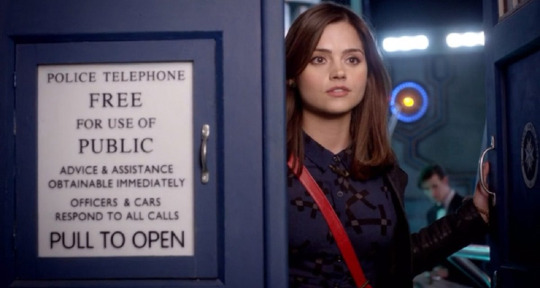
Clara is a whole other can of worms. I could probably dedicate an entire article to her character. I should clarify that my initial dislike for her character is somewhat mired in personal disappointment. By the time Clara was introduced, we had seen a string of modern human companions. We got the occasional tertiary companions from the future, such as Captain Jack or River Song. But we hadn't had a main companion from the past, future, or another planet. So when Jenna Coleman was introduced as Oswin Oswald, Junior Entertainment Manager of the starliner Alaska, I was very excited. Finally, a companion from the future! I was so ready for the Doctor to go on a quest to save Oswin from the cruel fate of becoming a Dalek. What an exciting storyline that was going to be.
And then we see her as governess Clara Oswin Oswald. Ok... Well at least she's still from a different era, right? Oh, she's dead now too? Oh. Much like Moffat's Dracula, all of this great promise was suddenly dashed against the rocks of a contemporary setting. Sigh. I was so excited. What we're given in “The Bells of St. John,” is a new character with less direction than either Oswin or the governess before her. So much that Moffat had taken to literally modulating her brain with an app. Maybe she's really good with computers now? Sorry friends, much like Rose Tyler's gymnastics and Peri Brown's botany, it's never going to come up again.
And this is the biggest issue I have had with Clara Oswald. She spends most of her screen time fluctuating between what character they're writing her as this week. The writers simply didn't know what to do with her while the Doctor tried to figure out why she's so "impossible." One week she's wacky, one week she's stern, another week she's bisexual queer bait. Her characterisation is all over the charts, which sadly, tracks with her entire storyline. She's a woman, fragmented across time, and so is her personality. And don't even get me started on that impossible girl nonsense.
Steven Moffat once said in an interview that one or two people usually guess his big reveal ahead of time, but that no one had guessed Clara's. Perhaps that's because nobody's fan theory was "It's going to be absolute shite." Instead of just being a woman who gets to be her own person, she has to become the most importantest companion. She has to save the Doctor by being planted throughout his timeline, saving him from the Great Intelligence. You know, by sometimes being born as herself, and other times being born as a Time Lord. Sometimes knowing who the Doctor is, other times having no idea whatsoever. Sometimes having a name that is a play on of Oswald, or Oswin, or Clara. And at no times did it make any kind of sense.
The funny thing is, that for me at least, Clara's character doesn't really become interesting until all of that nonsense is behind her. The Clara I find most compelling is the Clara in mourning. Clara post-Danny Pink is a Clara with focus. Her mood swings seem more from a place of destructive behaviour in the wake of great loss. Watching her hold the TARDIS keys hostage above a volcano was some seriously gripping stuff. Aside from the gross digs at her appearance, I found the Twelfth Doctor's relationship with Clara far more endearing than that of the Eleventh Doctor. It may have taken them until her final moments as a companion, but they did get her right, in the end.
3. Melanie Bush
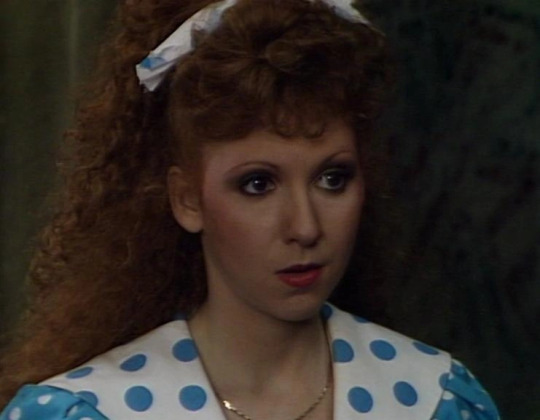
Back in 2015, I had the opportunity to meet Louise Jameson, who played Leela, my all-time favourite Doctor Who companion. I also got to meet Colin Baker, who was all charm. Also in attendance was Bonnie Langford, aka, Doctor Who's Mel. After having gotten autographs from Louise and Colin, and having circled the convention hall a few times, I decided "Sure, why not. Let's meet Bonnie Langford. It's only 10 quid for an autograph." Upon meeting her, she was a very kind woman, and even still, I was racking my brain for something nice to say about Mel. To save face, I lied a very simple lie. I said, "I really liked you in Doctor Who." She smiled, said thank you, and signed my picture. And I walked away, taking my shitty liar mouth with me.
Because the fact is, I didn't like her in Doctor Who. I found every moment she was onscreen excruciating. From her poodle haircuts, to her 80's disaster attire, to her fat-shaming the Sixth Doctor, to her constant screaming at every little thing, she depressed me. I spoke in my review of "Terror of the Vervoids," just how weird it was that we're never actually introduced to her as a character. Instead, Peri is written off, and suddenly, Mel is there, already chummy with the Doctor. You guys know Mel, she's the Doctor's friend, because we told you she was! Instead of getting to know Mel slowly, we're thrown into the deep end, forced to sink or swim within the curls of red hair piled high. Mel doesn't just come out of nowhere, she comes on strong. Fitness expert Mel here to get your fat Doctor Who loving asses into shape. Drink this carrot juice you geek pig!
Not even in Big Finish audios was I finding myself warming up to Mel. When Ace was introduced, they couldn't have pushed Mel out quicker. I found everything about Ace immediately refreshing. Here was a calm and collected badass rebel that I could get behind. It's ironic then; that it was in the Seventh Doctor era that I have begun to find something likeable in Mel. Much like Clara Oswald, a changing of Doctors enriched my appreciation for her character. This appreciation didn't come immediately, mind you, it came about around my third or fourth watch-through of "Paradise Towers."
Perhaps it's the influence of Andrew Cartmel, but with the Seventh Doctor, I have begun to appreciate Mel in the snarkiest manner. Mel is best utilised as a commentary on the Doctor/Companion relationship. She's precocious to a fault, she chews scenery, she screams at the drop of a hat, and she is oftentimes a naive idiot. Yet in "Paradise Towers," it becomes hilarious. Like much of the 80's era of Doctor Who, there is a very "2000 AD," atmosphere to the stories, and I could easily see this as a setting for Judge Dredd to drudge through, busting skulls and filling bodies with bullets. Setting the sunshiny persona of Mel against this backdrop is so brilliant that I can't imagine another companion in this story. Where she would usually grate against me, her sharp contrast from the things happening around her is exactly why I began to soften toward her.
Not even the ire from the Kangs could shake Mel's confidence, which is oddly what makes her cool. Or "ice-hot," as they would say. For the first time, Mel's headstrong sense of self makes her a rebel. She doesn't need to follow a crowd to feel accepted. Sadly, very few writers were able to find this core to Mel, but it was enough for me to be able to look at her in a different light. I could finally look at Mel and say I did like her in Doctor Who. Even if it was just for a moment, and even if it was somewhat at her expense. From a very cynical perspective, Mel can actually be pretty fun.
4. River Song
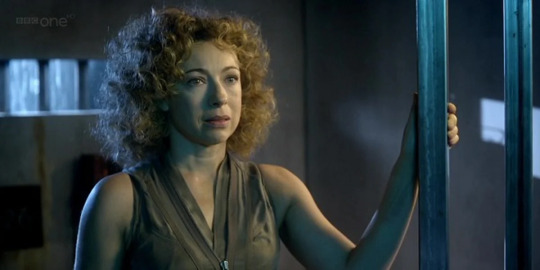
I know a lot of you are probably aghast to see River Song on this list, but I assure you, I have my reasons, and they are not without consideration. I should begin by saying some good things about River. She's smart, she's competent, she's got a healthy grasp on her sexuality, and she's cool. Why then did I not like her very much the first few times I watched her? Well, if you hadn't noticed, the bulk of this list are characters written by Steven Moffat, and once again, it all comes down to writing.
We're first introduced to River in the Tenth Doctor two-parter "Silence in the Library/Forest of the Dead." At first, she's just one of a team of forgettable space scientists on an expedition. However, as she finds out the Doctor is who he is, her entire demeanour changes. Like Mel on steroids, we're given a heaping dose of "Who does this bitch think she is, being all familiar with the Doctor?" Only, instead of it lasting one episode, it's every interaction we have with her character beyond this point. Instead of getting to watch River and the Doctor grow as a couple, we're forced to watch them meet in opposite directions. It is the antithesis of "show, don't tell." Everything about the Doctor and River's relationship is implied. "You're going to love me someday," she promises. Couldn't we just see it play out naturally? Spoilers.
This idea is one that can only really be done on a show like Doctor Who, where things are wibbly-wobbly, timey-wimey. The problem is, this doesn't mean that the idea is worth exploring, or even successful. It's made even worse when the relationship implied is one deeper than friendship. The Doctor is famously chaste, married only to his TARDIS and what lies ahead. Because of this, the idea of a person the Doctor will someday trust enough to share his real name and eventually marry carries with it a sizeable amount of convincing. Such a huge shift in the show's dynamic requires a lot of character development. Sadly none of that is to be seen onscreen. Who is Jim the Fish? Who cares? Steven Moffat's joke of "I'll explain later," became painfully prophetic of his time as showrunner.
I've got no complaints about River being a Time Lord, or even her being the child of Amy and Rory. Those elements are fine, really. It's the way in which she is presented which I find most detrimental to her character. I never did buy into the idea that the Doctor loved her as a wife. Their wedding seemed necessary to save the universe, as opposed to a union made out of love. Any kind of enjoyment I've ever gotten out of River stems mostly out of my love for Alex Kingston's performance. Where the show fails to establish her, she more than makes up for in style and substance. I grew to like River Song, despite the show's failure to ground her properly. River grew on me as she always said she would, but by no effort on the part of the writers. River is cool because River is cool, not because it was inferred that she was.
5. Susan
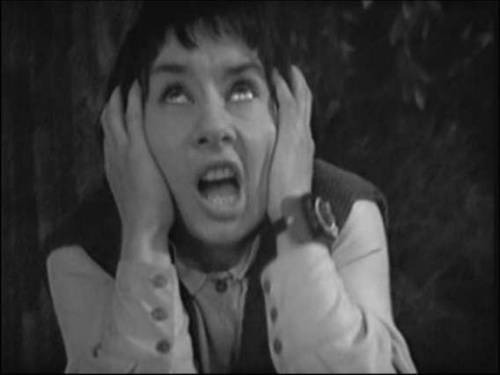
If you’ve followed this blog long enough, you’ll know I’ve already mellowed on Susan. In my reviews of the First Doctor era, I’ve had mostly good things to say about her character. This doesn’t change the fact that I found her utterly irritating at first, and it feels appropriate to talk about it here.
My initial dislike for Susan is a lot like my intial dislike for Clara. A lot of it was wrapped up in my own expectations of the character. Susan is the Doctor’s granddaughter. She is a Time Lord, therefore she should also be brilliant. And we get a lot of that in her first episode. She is mysterious, she’s enigmatic, and she is brilliant. Even her teachers at school found her perplexing. But the show doesn’t continue down that line. In fact, there are times when they make Susan borderline stupid. But how much of this is clouded by my own preconceptions?
For starters, Susan wasn’t a Time Lord. At least, not then. She was just a young girl. She may have been smarter than her fellow students, but this played more into how she was raised. So when the show depicts Susan screaming at every little thing, grabbing her hair dramatically, it smashed apart my mental image of a Time Lord. I couldn’t appreciate that they had her act this way to help sell a bad effect. Oftentimes Susan, like many Doctor Who companions, had her character sacrificed to make the baddies scarier. It was a product of her time, and even still I feel her character suffers for it.
However, one of the things I have discovered through repeat viewings of the First Doctor era is the surprising amount of character development among the TARDIS crew. The Doctor, Ian, Barbara, and Susan all go through deep character development that was sadly often secondary in classic Doctor Who. Before the nature of the Doctor and companions was transient, there was a feeling of a family bond forming. Through this, I have come to find Susan to be a rather deep and sensitive person.
When it comes time to say goodbye to Susan, I can’t say I exactly agreed with the method. The Doctor locking her out and deciding she was mature enough to set out on her own felt hasty. But I would be lying if I didn’t agree that Susan had gone from a little girl to a young woman at that point. When you stop expecting Susan to be the Doctor, and allow her to be a kid, she grows on you instantly.
6. Adric
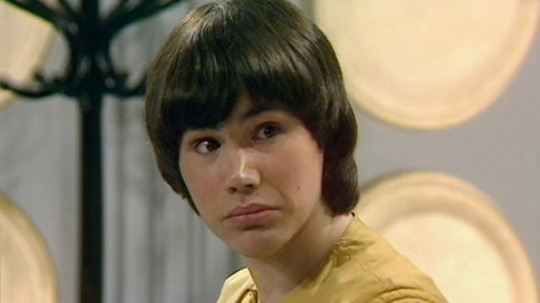
Let's be honest; it's not really original to hate on Adric. It's nothing new to point out what a bad companion he is, but here we are. Something I constantly endeavour to do on this blog is to be fair. One of my biggest complaints about the Doctor Who fandom is the proprietary attitude people take toward the fandom. The "I don't like it; therefore you shouldn't like it," attitude spat with such vitriol is one of the worst parts about being in the Doctor Who fandom. So when you say "Adric is my favourite companion," I'm not devising an argument for how wrong you are, it's fine. Like who you like. This doesn't mean I'm not also thinking in my head "What? Why?" Because I honestly, without malice, do not understand.
The most I ever enjoyed Adric, was in his introductory story "Full Circle." Setting him against a group of fellow Alzarians dilutes his lesser qualities. In fact, when paired with Varsh, he almost seems likeable. Sadly, we have to say goodbye to Varsh, and it's downhill from there. We're forced to watch a contrarian boy genius butt heads with the Doctor while he waddles around in a toddler's outfit while showing off his pound shop sheriffs badge for "mathematical excellence," to anyone who will listen. Adric is so obnoxious that he makes Wesley Crusher seem likeable in contrast.
However, it's not just his contrarian nature that makes me despise Adric, he's also disloyal to the Doctor and his friends. He's so susceptible to bad ideas as long as they a presented logically, that I've dubbed him the Ben Shapiro of the TARDIS. He's a smarmy little shit who believes himself superior to women, and he's really got no justification for his ill-placed self-confidence. Constantly demanding respect while giving very little reason to deserve it, he's like a poster child for incels. To make matters worse, he's oftentimes wrong and easily duped into taking the side of evil, turning him into more of a liability than an asset.
Recently, the idea that the Thirteenth Doctor could save someone from sacrificing themselves by using the TARDIS at the last moment to save them came under fire. "Why didn't the Doctor do this for Adric?" they said, forgetting conveniently when the Twelfth Doctor did the exact same thing in "Into the Dalek." But yes, why indeed? Why would the Doctor ever let a duplicitous, argumentative braggart die by their own stupid need to solve a math problem? My headcanon is that the Doctor got better at flying the TARDIS. The real reason is that people hated his character. The silence over the credits after Adric dies isn't out of respect for the character. The real reason is that the BBC couldn't secure the rights to Kool and the Gang's "Celebrate Good Times," before it aired.
Listen, I am not unsympathetic toward Matthew Waterhouse. He never should have been given such a big role, considering his utter lack of ability at the time. I imagine it was his own insecurity that fuelled his on-set antics. Giving unsolicited advice to veteran actors is cringey, but also the actions of a young and naive boy, in over his head. I know I said I was going to try and treat the performance as secondary, but in this case, it goes hand in hand. He has the stage presence of a fake. Every moment he's onscreen is disingenuous. The fact that he is present at the death of my favourite Doctor, stinking up the scene is genuine pain to me. If he has been made better in Big Finish, I've not yet heard it. As of now, there is nothing I've seen of Adric that has changed my opinion. But I'm glad if he makes you happy.
#Doctor Who#Danny Pink#samuel anderson#clara oswald#jenna coleman#Melanie Bush#Bonnie Langford#River Song#Alex Kingston#Susan#carole ann ford#adric#Matthew Waterhouse#tardis#bbc#companions
11 notes
·
View notes
Note
I really enjoyed reading your meta on RTD's companions' relationships with the Doctor. I was wondering if you could explain your thoughts on River in another meta post? I hope you're having a lovely day!
Ooh, I have A LOT to say about River. Probably more than is reasonable for one post, which is partly why it took me so long to answer your ask! Certainly too long for a post without a readmore.
II’ll try to follow a similar format here as in that other meta about the RTD-era companions, by starting with a discussion of River’s character more-or-less separately from her relationship with the Doctor.
So, who is River anyway? She was genetically modified pre-natally and kidnapped at birth specifically to create a perfect assassin to kill the Doctor (see, keeping her character separate from the Doctor is a tiny bit tricky). From the glimpses we get of it, we know that the first decade or so of her life was horrific. Far more traumatic than anything any previous companion endured, both in terms of duration and severity. And she escaped it, largely by her own efforts. But there’s no question, River is damaged.
We don’t know how exactly she made it to Leadworth right around the turn of the millennium, but she managed to arrange it so she’d be raised, not so much by her parents as with them, in their orbit. And this part of her life is also mostly a blank: we know she was in trouble a lot at school and with the local constabulary, but we don’t know if that’s because of her early conditioning or if her foster situation was also bad or if she’s just her mother’s daughter. What we DO know is that Mels is an incredibly tough and deeply troubled person who is, despite her conditioning, trying and mostly succeeding to carve out a life on her own terms, and who has a warm and loving relationship with her parents (who are also her peers).
But fate catches up with her. She meets the man she’s been trained to kill, she does the deed (though not, it must be noted, in the way her puppetmasters planned), and then she changes her mind. She gives all her remaining lives to save him–because of the knowledge she’s gained of who he really is, but perhaps more importantly the glimpse she’s given of who she can become in the future if she chooses a different path. What she is shown here, in a really concrete way, is that she has a choice. Whatever her reasons, it’s an incredibly selfless act from a self-described psychopath. And then she goes off and becomes an archaeologist. Others have written better meta than I could about that particular career choice; suffice to say I don’t believe for a nanosecond that she did it to track down the Doctor and leave him ridiculous messages (that’s just a side benefit).
And then she gets taken prisoner again, used to kill the Doctor again, and once again finds a way to NOT do the thing that fate/Kovarian demands of her. And then she gets imprisoned again, and escapes whenever she wants, but always goes back. Beats paying rent, I guess? Or maybe part of her feels safer in prison while she figures out how to be River Song. Prison is familiar territory, after all.
After her sentence is commuted, she gets a full professorship and goes on more adventures of her own–some of them above-board archaeological expeditions and others, well, less above-board. One of the latter sort takes her to a 24-year-long night of domestic bliss, and one of the former sort leads to her sacrificing her life for 4022 people (and/or her husband). After which she’s saved to a data core for who knows how long and still manages find a way out for field trips.
So that’s River. Her relationship with the Doctor is mixed through her whole life, but contrary to some opinions, it never defines her life. Nor do Kovarian’s machinations. River’s life is defined by her finding a way to choose her own path despite the plans of others.
My feelings about River’s relationship to the Doctor are complicated. As they should be.
So, when River first shows up (from the Doctor’s perspective, which is our perspective) people kinda either loved her or hated her, and I’m not sure that first impression ever changed much for a lot of us.
Me, I loved her. I liked that she put the Doctor on his back foot. She was his equal in a way we hadn’t seen since Romana, but this was different. I could never imagine the Doctor and Romana in love (not even her second incarnation, despite all that flirting). But when Lux said they were “bickering like an old married couple” and River had That Look on her face, I felt thrilled. I never got over it.
To me, River seemed like the right sort of love interest for the Doctor: an equal, yes, but not a mirror image. Later on, while others became frustrated with the revelation that her entire life had been timey-wimey manipulated to kill the Doctor, I saw it differently. Yes, she was “born to kill the Doctor,” and yes, it took her until the last moment to choose something else. But that choice was of a piece with her other choices–her other refusals to conform to the script Kovarian had written for her. She was a kind of wild force. Wilder even than the Doctor themself, who, let’s be honest, is a pretty tame renegade. River cannot be contained or controlled. So the Doctor doesn’t try. Or least, not very much, and never successfully.
There are still problematic aspects to their relationship, of course. She nearly destroyed time itself because she couldn’t bear to stand helplessly in that spacesuit and watch him die without telling him what he meant, not just to her but to the universe. That gesture was very much about her feelings for him, but I can’t help thinking it was also strongly driven by her need to assert control of her own life to the greatest extent possible, most of all in that moment where she couldn’t prevent the thing she dreaded most and had been herded toward literally all her life. The Doctor was, understandably, really annoyed at her grand gesture, but also deeply touched. Enough to let her in on his secret (“look into my eye”), and enough to finally let her into his hearts, to stop running from her and what she would come to mean to him, even knowing how it would end. Not really a healthy dynamic, but at least they were aware of that fact and honest about it.
And then, sometimes they relied on each other too much. Because they respected each other’s strengths, they sometimes forgot their weaknesses, and forgot to be gentle and kind to each other. Because each secretly thinks of the other as sidekick, we get to see a fair amount of them annoying each other and getting in each other’s way. We don’t get to see much of their happy times, because she’s not a regular companion, so we usually drop in on her (or she on us) when the crisis is imminent, if not already underway. For that reason it’s hard to assess their relationship fairly; we get told about a lot of fluffy stuff we don’t see, like their dates on Asgard and at the last great Frost Fair. We just get schmoopy allusions to the good times from River, and I suspect that how persuasive you find those aspects of their relationship depends to a large degree on how you feel about Alex Kingston’s delivery. Similarly we only get hints about her life apart from the Doctor.
I think part of the reason I love them so much and ship them so faithfully is this: While on the one hand River’s character as we see her in the TV series is entirely bound up in her relationship to the Doctor, at the same time their stories–and their relationship–are always also about something else. As a couple, I always imagine them shoulder to shoulder, hands clasped and facing the danger together, rather than facing each other in a tender embrace, each with eyes only for the other (except that one time on that explodey starliner; that was awesome).
There’s other stuff I could say about her, and about her relationship dynamic with the Doctor based on her audios, but this answer is long enough, I think.
5 notes
·
View notes